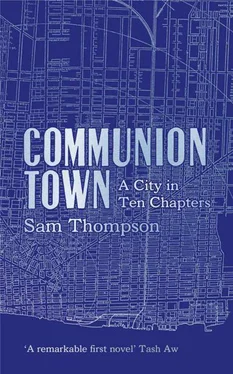She climbed out of bed and looked down into Ectarine Walk, where the last of the doctors and solicitors were disappearing towards the metro station and the elm trees were dropping their papery fruit to be swept along the street by a damp spring wind. While she stood at the bedroom window the sky seemed to grow a fraction dimmer as if dusk had been falling since before day began.
Downstairs she let the cats in and fed them while the kettle boiled. After a cup of tea she got dressed and tidied the kitchen. It was important to stick to the established rhythms and routines and still to keep building up gradually, always doing a little more but never too much, but today in spite of herself she found that each household duty was marked with an extra significance. She felt as if she was about to set out on a journey into unknown regions and this was the last time she would rinse the teapot or rub Misto’s head when he came to sniff at her knee.
The kitchen compost box was full, so she stepped into her gardening shoes and carried it outside. The lawn would have been as tall as her waist if the grass had been upright, but it lay waterlogged and buckled under its own weight. The flowerbeds had become thickets and the silver birch was clogged with the pale threads of a climbing weed. She would put all this right eventually, but the discipline was not to worry about it now and only to do as much as she was able. At the bottom of the garden she opened the lid of the compost bin and upended the loose brick of tealeaves, eggshells and vegetable peelings into the hot mulch. Two months ago she could not have managed even this.
After turning him away she had relapsed worse than ever. The old pains had bloomed in her spine and shoulder and the familiar headache had settled back behind her eyes, throbbing with each pulse, indifferent to analgesics; over the days that followed his departure, her muscles grew dull and sore as stones and soon she was submerged and sinking, slowly flailing, into that tranced depth where pressure trapped her head, light rippled down too bright through the surface of the world and every noise was a dissolving concussion, at once muffled and too loud. It was hard to hear what people said, impossible to think straight, hopeless to imagine going outside or reading a book. Time swamped her. She shivered with fever. She wanted only to sleep but lying in bed was a day’s hard work at the end of which getting up to feed the cats would cost her the last of her strength. If this carried on for long it would actually be the end of her: the house would fall into ruin, the unfed cats would leave in search of new homes and she would stay here forever, stranded, insomniac and mad with exhaustion.
She could not explain why things had turned out otherwise, but somehow she had begun to struggle her way back up from the depths of fatigue. It was impossible to imagine, now, where she had found the resources for such an act of will, but one day she had opened the old notebook she had used for her recovery plan the first time. In it she had mapped her life hour by hour, plotting the difference between what she had done when she was well and what she could manage now, forcing herself to be realistic, trying to think of ways to make her tasks easier, instructing herself that it must all happen at a slow pace, step by step. She did a little more each day. Over a week or a fortnight she would begin to feel better; then she would ask too much of herself, staying out too long or trying to set things straight in the house too quickly, and she would slip backwards and have to pick herself up all over again. The months had passed and with intolerable slowness she had improved. And as the fatigue had retreated, it had left behind the immovable, hurtful weight deep in her chest which she had buried there by sending him away.
The cats met her halfway down the garden and stalked her heels back up to the house. She scrubbed out the compost box in the kitchen sink and set it upside down in the rack. The weight hung in her chest now as always. It tightened her breathing as if she was about to panic — she had to remind herself that this was not panic but something harder to name — and now, as often, she asked what kind of person she must be to stand here with such a weight in her, drying her hands on the tea towel and gazing out of the window behind the sink. Questions like this did not help. She did not know whether she had the energy to spare for a walk to the grocer’s but she had given the cats the last of their tinned food this morning, so she found a cloth shopping bag, put on her coat and went out. There was no need to hurry. Everything that needed doing would be done in its time.
Standing on the pavement she glanced up to make sure that the bedroom window was closed, and set off along the street, not trying to walk too fast. Through these last months there had been nothing of her to spare, she had been consumed by the work of recovery: but then one day she had looked back at that evening half a year ago and found that her guilt no longer scorched thoughts away to nothing. She could look steadily into the past and ask herself why she had done it. If she ever really caught a glimpse of herself it wasn’t when life unfolded to plan but at those moments when she didn’t know what in the world she was doing, when she was drowning in some hurt, some desire or resentment or regret. She knew it now: now that she lived this orderly life with one hurt swelling endlessly inside her.
She remembered the Gaunt exhibition, their first outing together. He had walked into the gallery as if he expected to be arrested — it had been obvious that he’d never heard of Albert Gaunt before that time in the library when he’d made her smile by using the printmaker’s name so clumsily to strike up a conversation — but when they started looking at the pictures he had forgotten his nerves. He had studied the small, dense lithographs and pointed out details which Florence had never noticed. He’d taken no interest in the information placards beside the prints; she on the other hand was always reprimanding herself for reading the text first, as if she needed to be told what to see. When they walked along the river afterwards it was as if they’d already known each other a long time. Slow learner that she was, it had never quite occurred to her that you could walk around all afternoon and into the evening with someone you had known for a day and already liked better than you could understand. On her way home she had reflected that there must be certain people in the world, a very few, with whom you’ll never need to search for what to say, and you know you’ll never reach the end.
Turning on to Lizavet High Street she passed the veterinary practice and thought of Emmie, whom she had finally taken to the vet three weeks ago because along with the yowling the poor old thing had started wheezing painfully and dragging a paralysed back leg around the house. Florence had stroked her as the vet had given the injection. Simon would have refused to understand why she had waited so long.
She bought six cans of catfood in the grocer’s and paused to rest in the café next door before going home. She sat in the window, at the table where they had often spent hours together looking out at the au pairs with their pushchairs progressing along the ten or twelve shopfronts which made up the high street. Once, after swallowing another in the series of espressos which he liked to drink while she took her time over a pot of tea, he had waved a hand dismissively at the street and told her that this place wasn’t real . That had made her suddenly furious. She had wanted to argue with him and prove what a stupid thing it was to say, but as usual she hadn’t. She knew he’d win because arguing made her tongue-tied and she would run out of indignation first; but as she fumed she had realised that he was not going to change. He would never completely believe in ordinary things, the things he could touch. That had been the moment at which she had betrayed him, she supposed, by losing interest in his point of view. She had done her best to be patient, and to wait for him to see that though he took such pains to demonstrate that his heart was elsewhere, his life with her told a different story. In the end, though, she had not been able to show him that he already had what he needed, that what was real was the heath, the house, their meals, their bodies, the days and years they spent together.
Читать дальше
Конец ознакомительного отрывка
Купить книгу












